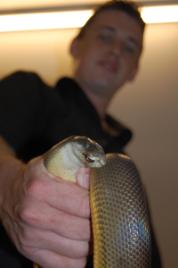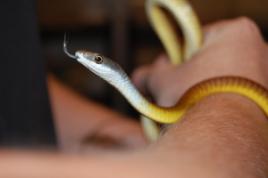Changes to venomous snakes guidelines
Published on 11 September, 2008
BY STUDENT REPORTER CAMERON JACKSON
Northern Territory residents will now be allowed to keep highly dangerous and venomous snakes as pets under new guidelines from the NT Parks and Wildlife Service.
 The guidelines were based on industry advice, species availability and access to anti-venom in the NT so as to better protect Northern Territory wildlife and members of the public who choose to keep venomous snakes.
The guidelines were based on industry advice, species availability and access to anti-venom in the NT so as to better protect Northern Territory wildlife and members of the public who choose to keep venomous snakes.
Jon DeLaine from the NT Parks and Wildlife Service's Wildlife Management Unit said the new guidelines will provide better protection for all involved.
"Not only for the Territory's wildlife, but also for members of the public who choose to keep venomous snakes as pets. Prospective venomous snake owners should be well informed of the needs and requirements for keeping these animals in captivity," he said.
Venomous snakes are ranked into three categories from level 1 mildly dangerous snakes to level 3 highly dangerous snakes such as brown snakes and death adders.
As a result, Jon Delaine said ownership will be based on a progressive system.
"You start with Level 1 snakes which won't necessarily kill you but they'll make you sick.
"In order to reach Level 3 and keep death adders and taipans you need a number of years experience in handling venomous snakes and a first aid certificate," said Mr DeLaine.
And although there is always the potential for a snake to escape, the guidelines reinforce that they must be kept in lockable containers.
 "It's like gun laws. Owners of these Level 3 venomous snakes need to prove there is a room in their house that can be secured. It can't just be on display in the lounge room or in a corridor. It specifically has to be in a locked room where only the person who is permitted to handle it has access.
"It's like gun laws. Owners of these Level 3 venomous snakes need to prove there is a room in their house that can be secured. It can't just be on display in the lounge room or in a corridor. It specifically has to be in a locked room where only the person who is permitted to handle it has access.
"There's a real safety issue with people being allowed to keep these dangerous animals but we also want to support those who have a passion for keeping wildlife," he said "and this is the way to do it."
Geoff Brouss is a professional snake-catcher for the ‘Ark Animal Hospital'.
He runs a 24-hour callout service for catching run-away reptiles and said although the new guidelines may mean an increase in snake owners it shouldn't mean an increase in escapes.
"I think it's completely up to the person if they want to keep it or not. As long as they're secure and can't do any damage to the neighbours.
"Still, I wouldn't approve of them in apartments.
NT Parks and Wildlife Service' Jon DeLaine agreed.
"I don't really see the attraction in keeping them. You're asking to get bitten. If it's a python then it's not going to fatally bite you but with a venomous snake you need specialist handling tools.
"They do make an interesting study animal but you can't exactly cuddle a snake or take it for a walk like a cat or dog.
"Personally I think it's the type of pet for middle-aged men with ego issues," Mr DeLaine laughed.
People interested in owning venomous snakes should contact the Northern Territory Parks and Wildlife Service on 8999 4486 for an assessment and to arrange an inspection of their property.

